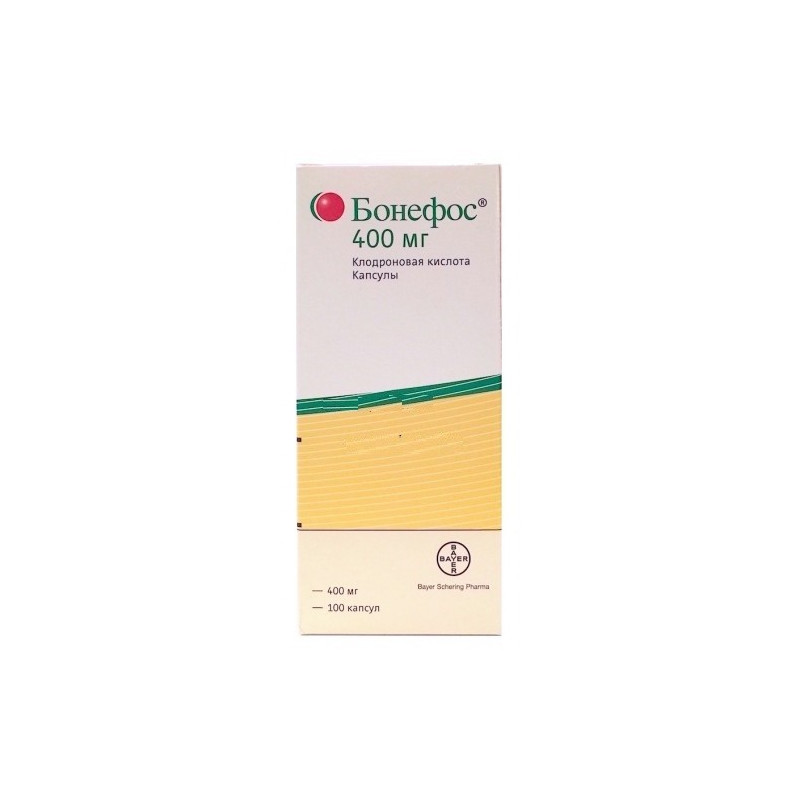



 All payments are encrypted via SSL
All payments are encrypted via SSL
 Full Refund if you haven't received your order
Full Refund if you haven't received your order
Latin name
Bonefos
Release form
Capsules
Packaging
100 pieces
Bone resorption inhibitor for malignant tumors and bone metastases. Bonefos also reduces the incidence of bone metastases in breast cancer. Belongs to the group of bisphosphonates, is an analogue of natural pyrophosphate. Selective action due to the high affinity of bisphosphonates to the mineral components of bone.
Suppresses the activity of osteoclasts, reducing osteoclast-mediated bone resorption. The exact mechanisms of this process are not fully understood. In hypercalcemic conditions, it reduces the elevated Calcium level in the blood plasma and reduces urinary excretion of calcium and hydroxyproline.
In in vitro studies, bisphosphonates inhibit the precipitation of calcium phosphate, block its transformation into hydroxyapatite, inhibit the aggregation of apatite crystals with the formation of larger crystals and accelerate the reverse dissolution of these crystals.
When clodronic acid was used in monotherapy in doses sufficient to inhibit bone resorption, no effect on normal bone mineralization was observed in humans.
In patients with breast cancer and multiple myeloma, clodronic acid reduces the risk of bone fractures.
Bonefos reduces the incidence of bone metastases in primary breast cancer; in patients with resectable breast cancer, when using the drug for the prevention of bone metastases, there was also a decrease in mortality.
- osteolysis in metastasis of malignant tumors in the bone and multiple myeloma (multiple myeloma);
- hypercalcemia due to malignant tumors;
- prevention of bone metastases in primary breast cancer.
- pregnancy;
- lactation (breastfeeding);
- concomitant therapy with other bisphosphonates;
- hypersensitivity to the drug and other bisphosphonates.
Bonefos is not prescribed for children due to the lack of clinical experience of its use.
Caution should be exercised when using the drug Bonefos in patients with impaired renal function.
The drug is not recommended for use during pregnancy and lactation (breastfeeding) due to the lack of data currently on the effect of Bonefos on reproductive function and fetal development.
Ensuring sufficient hydration of the body is especially important when applying Bonefos in the form of intravenous infusions, as well as for patients with hypercalcemia and renal insufficiency.
With the on / in the introduction of Bonefos in doses that are much higher than recommended, it is possible that severe kidney damage may develop, especially at an excessively high infusion rate.
Control of laboratory parameters
On the background of the drug should be monitored kidney function, the level of calcium, phosphorus and Magnesium in serum.
During therapy with Bonefos, one must take an adequate amount of fluid.
Athypercalcemia due to malignant tumors, after normalization of the calcium level in the blood serum, the drug is administered orally at a maintenance dose of 1.6 g / day.
For treatmenthypercalcemia when it is impossible to administer intravenously, Bonefos is administered orally at high doses of 2.4–3.2 g / day, depending on the patient’s individual response, with a gradual transition to a maintenance dose of 1.6 g / day.
Forprevention of development of bone metastases of primary breast cancer the drug is administered orally at a dose of 1.6 g / day.
Atosteolytic bone changes due to malignant neoplasms, without hypercalcemia dosing regimen set individually. The recommended initial dose for oral administration is 1.6 g / day. If necessary, you can increase the dose. The maximum dose is 3.2 g / day.
Gastrointestinal: most often (up to 10%) - nausea, vomiting, diarrhea (most often manifested in mild form and occur when used in high doses), increased activity of hepatic transaminases (in rare cases - more than 2 times higher than the upper limit of normal).
Fluid and electrolyte balance: asymptomatic hypocalcemia is possible; rarely - hypocalcemia, accompanied by clinical manifestations.
On the part of the endocrine system: possible increase in the level of parathyroid hormone in the blood plasma (usually in combination with a decrease in the level of calcium in the blood).
Urogenital: possible increase in serum creatinine, proteinuria; after rapid administration of the drug may develop acute renal failure.
Other: hypersensitivity reactions, changes in the concentration of alkaline phosphatase serum in the blood serum (increase in alkaline phosphation is possible in patients with bone metastases), skin reactions are possible; in patients with bronchial asthma, with hypersensitivity to Acetylsalicylic acid - impaired respiratory function, bronchospasm.
Store at a temperature not exceeding 25 ° C.
